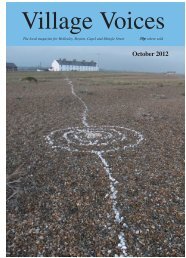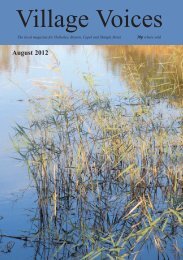You also want an ePaper? Increase the reach of your titles
YUMPU automatically turns print PDFs into web optimized ePapers that Google loves.
Now the Act has become law, Suffolk<br />
Wildlife Trust and its counterparts in<br />
Essex and Norfolk are hard at work<br />
identifying the key marine wildlife<br />
areas in the North Sea that require<br />
special protection. There are renowned<br />
hotspots for marine life along the<br />
north and northeast coasts of Norfolk,<br />
where some wrecks have acted<br />
as rocky reefs for almost a century,<br />
and which possess a rich community<br />
of fish, anemones, seaweeds, starfish<br />
and lots of other sea life. The famous<br />
lobsters and crabs that sustain a local<br />
fishing industry are found in the<br />
Sheringham Chalk Gullies—another<br />
potential Marine Protected Area. Suffolk<br />
has a 60-mile coastline. Offshore,<br />
sandy plains are home for huge beds<br />
of striped Venus clams, and also brittle<br />
stars and heart urchins, whilst commercially<br />
important cod and herring<br />
a re found in de eper, ope n w ater.<br />
The North Sea—especially the Dogger<br />
Bank—was once full of cod, skate and<br />
mackerel. The fabled herring shoals<br />
provided a hard, but reliable living for<br />
many generations of fishermen. The<br />
Atlantic herring feeds on plankton, and<br />
the numbers of ‘silver darlings’ were<br />
once so great that beaches and fish<br />
quays were often knee-deep in them.<br />
The shoals were important to predatory<br />
bluefin tuna, dolphins, porpoises,<br />
whales, seals and blizzards of seabirds.<br />
Research now shows that close to 99%<br />
of the fish biomass has been lost during<br />
decades of overfishing and habitat<br />
destruction on the seabed. The fish are<br />
getting smaller and fewer, and some<br />
species are now gone.<br />
The next five years will be vital. The<br />
new Marine Act is a great piece of<br />
long-overdue legislation, but that is<br />
all it is. The real challenge will be to<br />
make things happen, to achieve real<br />
change, and for the 800,000−plus<br />
members of the wildlife trusts, backed<br />
by other conservation <strong>org</strong>anisations<br />
to hold Government to its pledge to<br />
Rob Spray<br />
<strong>January</strong> 2010 page <br />
Sandwich Tern<br />
www.<strong>villagevoices</strong>.<strong>org</strong>.<strong>uk</strong>
















